

Chapter 2: Biology of Psychology. Chapter 3: Consciousness. Chapter 11: Heath & Well-Being. Chapter 5: Sensation & Perception. Chapter 6: Learning. Chapter 7: Memory. Chapter 8: Thinking and Intelligence. Chapter 9: Motivation & Emotion. Chapter 10: Sex, Gender, & Sexuality. Chapter 13: Personality Psychology. Fidget spinners seem to cause worse memory and attention - Everyday Research Methods.
The fidget spinner IV was manipulated as independent groups in the first study and as within groups in the second.
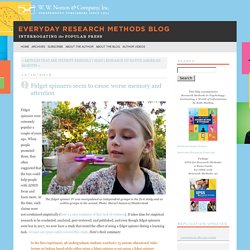
Photo: Marcel Jancovic/Shutterstock Fidget spinners were extremely popular a couple of years ago. When people promoted them, they often suggested that the toys could help people with ADHD focus and learn more. At the time, such claims were not scrutinized empirically (here's a nice summary of this lack of evidence). It takes time for empirical research to be conducted, analyzed, peer-reviewed, and published, and even though fidget spinners were hot in 2017, we now have a study that tested the effect of using a fidget spinner during a learning task.
Fidget Spinners: What They Are, How They Work and Why the Controversy. This season's hottest toy is marketed as an antidote for attention deficit hyperactivity disorder, anxiety and autism — but it's also being banned in classrooms across the country.
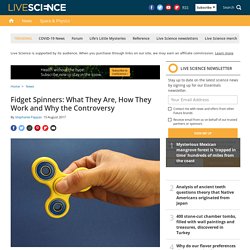
"Fidget spinners" are small, ball-bearing devices that the user can rotate between his or her fingers. The momentum of the toy provides a pleasing sensory experience, according to user reviews, while the challenge of tossing, transferring and twirling the spinners has spawned an entire universe of instructional YouTube videos. [How Fidget Spinners Work: It's All About the Physics] Many spinners are marketed as aides for individuals with anxiety, autism and ADHD; Cppslee's spinner marketing patter on Amazon, for example, promises greater concentration for people with those conditions, plus an opportunity to "bring out that creative genius lying deep within you.
" [Why Fidget Spinners Are So Hot (and Where to Buy Them)] Unsurprisingly, these claims are probably overblown, scientists say. A trend erupts. Study finds using a fidget spinner can impair memory and attention. New research indicates that fidget spinners can be harmful to learning in classroom settings.
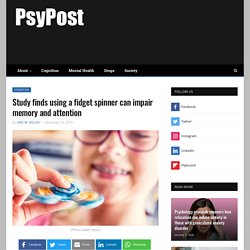
The study was recently published in the journal Applied Cognitive Psychology. “A few years ago, the discussion about the efficacy of fidget objects was suddenly a national conversation. In light of this debate, some of my students asked me if I thought fidget spinners might help with classroom learning and attention. So, I decided to gather some data to help answer this question,” explained study author Julia Soares, a PhD Candidate at the University of California, Santa Cruz. In two experiments, the researchers found that fidget spinners could negatively affect memory and attention. Error - Cookies Turned Off. Fidget spinners have experienced a rapid rise in popularity, at least partially because they are marketed as attentional aides with the potential to enhance student learning.
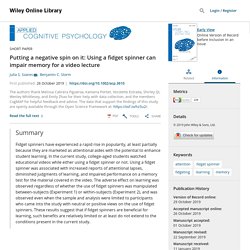
In the current study, college‐aged students watched educational videos while either using a fidget spinner or not. Using a fidget spinner was associated with increased reports of attentional lapses, diminished judgments of learning, and impaired performance on a memory test for the material covered in the video. Civic Online Reasoning. 85 Great Tech Resources for Psychology Students. By Kristen Fescoe May 2015 Psychology is one of the most sought-after majors at colleges throughout the United States.

Some students pursue a Bachelor’s Degree in Psychology as a springboard to a career in professional Psychology, while others will move on to different areas of study and practice. Regardless of your long-term goals, there are a number of resources available for psychology students at the undergraduate and graduate levels. As technology advances, students report that they take advantage of tech resources more and more often.
Things like mobile apps, online textbooks, important websites, study skills resources and online groups help students stay on top of their studies and on top of the field. The goal of this guide is to outline the best technological “must haves” for students of psychology and to highlight some of the most cutting edge technology to help students succeed academically, socially and professionally. About the Author Brain Lady Blog – Written by Dr. Back to Square One: Using Crossword Puzzles to Teach Cognition Principles - Google Slides. Classroom Resources. Society for the Teaching of Psychology - Teaching Resources.
Teaching resources are documents that can pertain to any aspect of teaching.
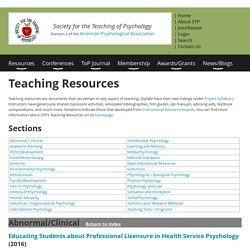
(Syllabi have their own listings under Project Syllabus.) Instructors have generously shared classroom activities, annotated bibliographies, film guides, lab manuals, advising aids, textbook compendiums, and much more. Notations indicate those that developed from Instructional Resource Awards. You can find more information about STP's Teaching Resources on its homepage. Sections. English Grammar Rules.
APA & MLA Research Papers: How to Use Sources in Your Essay. Deepfakes: Can You Spot a Phony Video? SPARQTools. Edible Neuron Models. Edible Neuron Diagram. Brain Study Module. Welcome to the Midsagittal Brain Study Module Page!
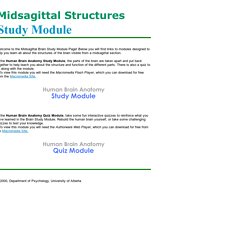
Below you will find links to modules designed to help you learn all about the structures of the brain visible from a midsagittal section. In the Human Brain Anatomy Study Module, the parts of the brain are taken apart and put back together to help teach you about the structure and function of the different parts. There is also a quiz to go along with the module. **To view this module you will need the Macromedia Flash Player, which you can download for free from the Macromedia Site. In the Human Brain Anatomy Quiz Module, take some fun interactive quizzes to reinforce what you have learned in the Brain Study Module. 2011 melo3d psych objectbrainworksheet learningobject. The Mind Online Podcast. Google BeInternetAwesome DigitalCitizenshipSafety 2019Curriculum.
The Psychology Podcast with Dr. Scott Barry Kaufman. Short Wave podcast from NPR. Seeing Monsters? It Could Be The Nightmare Of Sleep Paralysis. Daniel Simons. Scott Fraser. Elizabeth Loftus. Carol Dweck: The power of believing that you can improve. Tony Porter: A call to men. Alison Gopnik: What do babies think?
Frans de Waal: Moral behavior in animals. Street Philosophy With Jay Shetty.